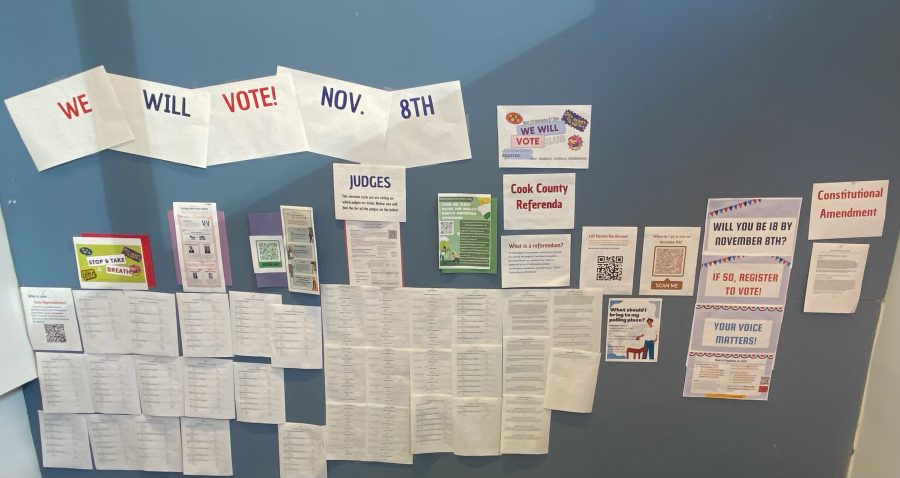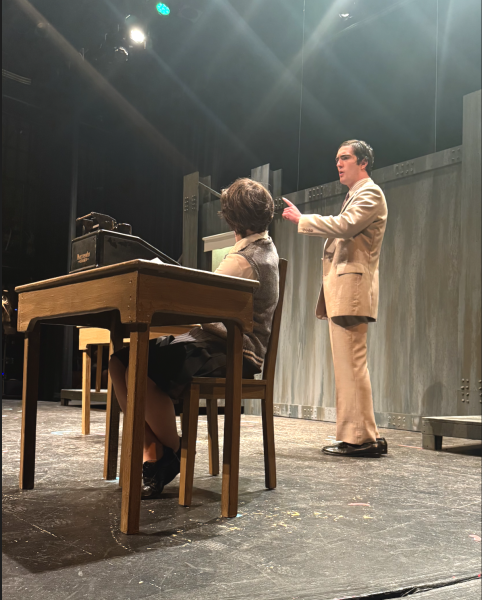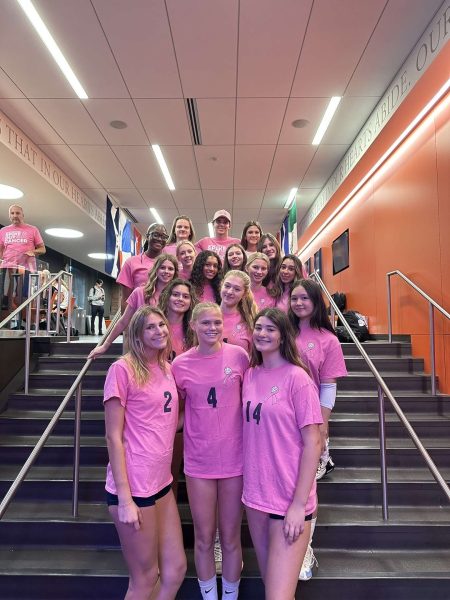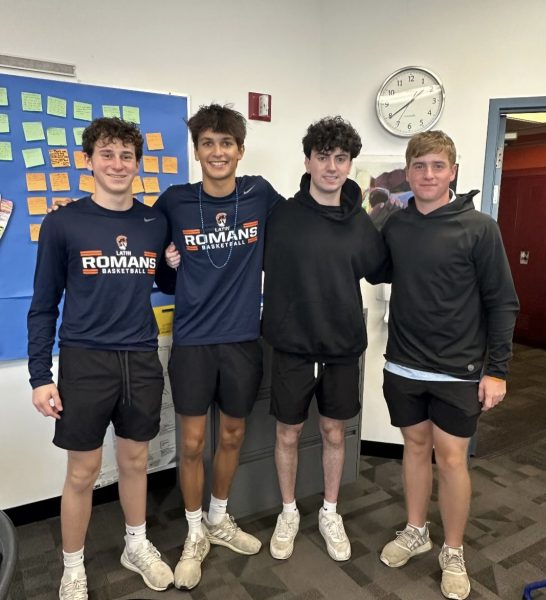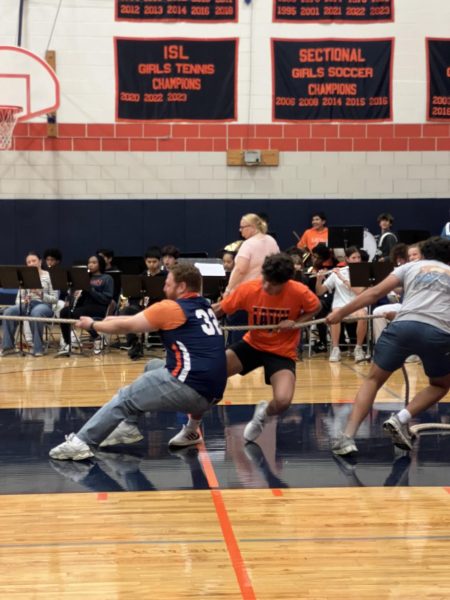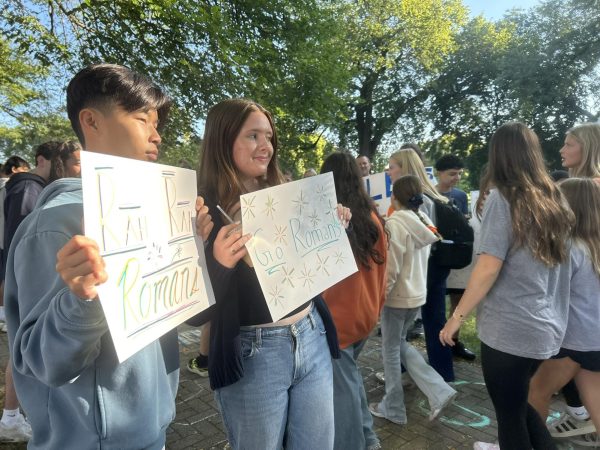2022 Midterm Elections Met with Anxiety and Anticipation
Voting information presented by the We Will Vote Club in the main stairway between 4th and 5th floor.
The 2022 midterm elections took place on November 8 amid political turmoil and polarization across the country. Voters flocked to the polls in record numbers, motivated by many political issues, including crime, political violence, abortion, foreign policy, and an inflationary economy.
As is the case every two years, all 435 seats in the U.S. House of Representatives were up for grabs. Also available were 35 seats in the 100-member U.S. Senate, 36 state governorships, three U.S. territory governorships, numerous city mayorships, and 129 ballot measures across 36 states. Laws on abortion in California, Kentucky, Michigan, Montana, and Vermont were also on the line.
Early on, it looked as though Republicans would benefit from the historical midterm election precedent and would regain control of both the House and the Senate. Nevertheless, Democrats showed early voting enthusiasm on the heels of the U.S. Supreme Court’s decision to overturn Roe v. Wade, ongoing Congressional investigations into the January 6, 2021, assault on the Capitol, and frustrations with an ever-increasing number of election fraud conspiracy theories. All of the above, amplified by intensely active and costly campaigning on both sides, drove nail-bitingly close races across the nation Tuesday night, and voters anxiously watched the results roll in.
The Republican party scored the first punch of the evening, with Florida Gov. Ron DeSantis winning by a large margin over Democratic nominee Charlie Crist. Marco Rubio easily retained his U.S. Senate seat in the Sunshine State, and Florida Republicans secured five House seats. As the Miami Herald’s front page on Wednesday said, “Florida goes all in for the GOP.”
Still, Democratic fears of an overwhelming red wave across the country never truly materialized. By Thursday night, Republicans looked like they would overtake the House majority, albeit by a much slimmer margin than expected. The fate of the extremely slight Democratic edge in the 50-50 Senate—with Vice President Kamala Harris as the tie-breaking vote—remained too close to call for four full days after the election, as the nation awaited results in Arizona, Nevada, and Georgia.
Late Saturday night, the Senate races in both Arizona and Nevada were called for the Democrats, guaranteeing that Democrats would retain control of the Senate for the next two years. Georgia will hold a run-off election on December 6 to determine whether the Democrats enter the new term with 50 or 51 senators. (The Democrats picked up a seat with John Fetterman’s huge win in Pennsylvania, as he replaces a Republican senator.)
In Washington state, voters continued to seek out representation that better mirrors the voters themselves. The Richmond Free Press noted that “these are signs that the American promise that all ‘men (and women) are created equal’ still embodies some truth amid the sharp political divisions of our era.” In short, voters want identifiable and relatable elected officials.
Maura Healey became the first openly gay woman elected as the governor of Massachusetts, and Arkansas and New York also elected their first female governors. Meanwhile, Wes Moore became the first Black governor of Maryland, Alex Padilla became the first Latino candidate elected to the Senate from California, and Katie Britt became the first woman from Alabama elected to the Senate.
Here in Illinois, the race for governor was not expected to be hotly contested. Gov. J.B. Pritzker easily defeated his opponent, Republican Darren Bailey. Donny Pritzker, Latin senior and son of the governor, said he felt fairly confident going into the election. “There is always some amount of uncertainty with politics, but going into Tuesday, the polls looked quite favorable,” Donny said. “I would say there was a cautious optimism in the air as we waited for the numbers to roll in.”
While watching with his family at the Marriott Marquis, Donny said, “WGN called the race without any results, which [neither] I nor my family had ever seen before.” Gov. Pritzker will now serve his second term.
Democrat Tammy Duckworth also easily retained her U.S. Senate seat, and Democrats Susana Mendoza and Michael Frerichs won for Illinois Comptroller and Treasurer, respectively.
Relevant to drivers-license-seeking Latin high schoolers, Democrat Alexi Giannoulias (Latin Class of 1994) will succeed Jesse White as Illinois Secretary of State. Other closely watched races in Illinois for Congressional seats included the 6th District, won by Democratic Representative Sean Casten, and the 14th District, won by Democrat Lauren Underwood.
Maryland and South Dakota voters approved the use of recreational marijuana for those ages 21 and older, while Arkansas and North Dakota rejected similar laws. Alabama, Tennessee, and Vermont voters elected to remove state constitutional language that allowed slavery as a form of criminal punishment. Lastly, state constitutional measures in Michigan, California, and Vermont reaffirmed abortion rights.
Finally, Democrat Maxwell Frost is the first member of Gen Z elected to Congress. Frost will represent a district in central Florida that skews Democratic. In fact, Gen Z had a huge impact on the midterm elections. According to the Philadelphia Inquirer, “Early exit polls show that a surge in young people voting in the midterm election may have boosted overall turnout and contributed to some better-than-expected results for Democrats.”
Upper School history teacher Debbie Linder emphasized Gen Z’s impact. She said, “You guys came out in droves—there’s lines and lines of students who are lining up at the University of Michigan … all places, lines and lines of kids waited for hours and hours to both register and to vote.”
Surly, Latin students contributed to these close numbers as well. The We Will Vote Club, of which Ms. Linder is the faculty advisor, encouraged eligible students to participate in the election and even assisted in their registration process. Ms. Linder said, “[They] registered almost 25 people to vote that day.” Many of these students, who weren’t pre-registered might have not otherwise voted.
“These were people who just needed someone to be in their face, and they did it,” Ms. Linder said. “And I had a lot of kids go up to me and say, ‘I voted for the first time.’ That’s really empowering and really exciting.”
Senior and Co-Head of We Will Vote Club Daniel Braun said, “It is important for people to vote, to have their voices heard and keep their leaders accountable. I encourage Latin members to vote by educating them on what is on their ballot, holding voter registration drives, and educating them on resources for voting.”

Mia Kotler ('25) is thrilled to be one of the Editors-in-Chief for The Forum this year. She is a passionate writer who enjoys expressing her views and...














































